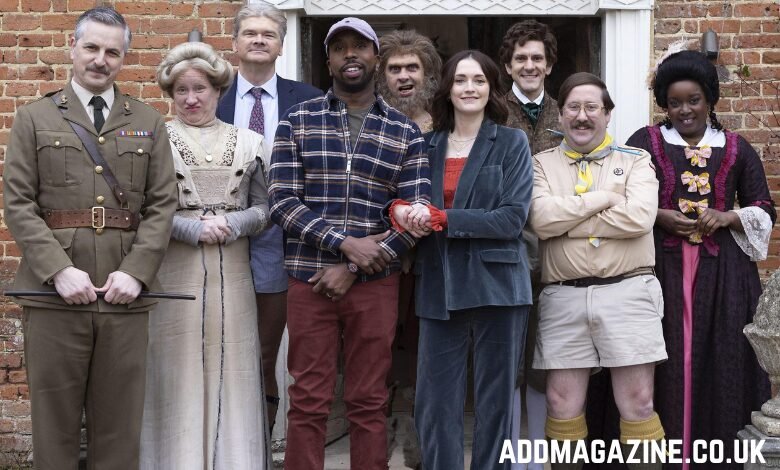Kevin Corbishley was a highly respected member of the British television production community, known for his skill as a light rigger and his dedication to the projects he worked on. His career was not one that placed him in front of the camera, yet his work was essential in shaping the look, feel, and technical execution of the shows audiences enjoyed.
For viewers of BBC series such as Call the Midwife and Ghosts, Kevin’s name appeared only briefly—in the credits or in heartfelt tributes. But within the production teams, he was much more than a name. He was a colleague, a professional, and a friend whose efforts directly contributed to the success of each episode. His untimely passing in 2022 left a notable absence in the industry and in the hearts of those who knew him.
Career Beginnings and Role in Television Production
While public details about Kevin’s early career are limited, his work history suggests he had years of hands-on experience in technical production roles before joining high-profile television projects. A light rigger’s role is physically demanding, highly technical, and requires a strong understanding of both safety protocols and creative lighting needs.
A rigger works closely with the lighting department to position, secure, and maintain lights and related equipment. In television, lighting is not just about illumination—it’s about creating mood, atmosphere, and focus within each scene. This means a rigger’s work directly influences the audience’s visual experience. For a period drama like Call the Midwife, which depends heavily on a warm and nostalgic visual tone, precision in lighting setup is essential. Kevin’s ability to meet those demands was a key reason he was trusted on set.
Work on Call the Midwife (2020–2022)
Kevin joined Call the Midwife in 2020 as a rigger and worked on 15 episodes across several seasons. This series, set in London’s East End during the mid-20th century, is known for its emotional storytelling and period accuracy. The production required careful attention to lighting so that scenes matched the look of the era being portrayed.
Kevin’s role would have involved working closely with gaffers, cinematographers, and set designers to ensure every location was lit in a way that supported the narrative. Whether it was a dimly lit night-time street, a bright delivery room, or an outdoor market scene, each setup required planning and technical precision.
His final contribution to the series came during the filming of season 11, with the finale episode being his last. When that episode aired in February 2022, the show honored his memory with an on-screen message:
“In memory of Kev Corbishley: 1965 – 2022”
The tribute was short, but for those who worked with him, it carried deep meaning.
Contribution to Ghosts
In addition to his work on Call the Midwife, Kevin was also part of the team behind the BBC comedy Ghosts. He joined the production in its second season and remained involved through its later stages.
Ghosts is a completely different kind of show from Call the Midwife, with a comedic tone and an ensemble cast playing both living and ghostly characters. The lighting requirements for a series like this are varied—balancing bright, cheerful visuals with subtle effects to distinguish the living world from the spectral one.
Kevin’s expertise as a light rigger would have been crucial for maintaining the look of the show, particularly during its location shoots at historic properties. Large sets often require complex rigging solutions, sometimes in places not designed for modern film equipment. Handling such challenges without disrupting the set or the actors is a skill in itself.
Tragically, Kevin passed away shortly before filming began for the fourth season of Ghosts. The season premiere opened with a dedication to him, another reminder of the impact he had on his colleagues and the productions he supported.
Skills and Qualities That Defined His Work
Although viewers rarely see the technical crew, productions rely heavily on people like Kevin to run smoothly. Being a rigger is more than just setting up lights—it’s about problem-solving under pressure, adapting to unexpected issues, and working collaboratively with other departments.
Some qualities that likely contributed to Kevin’s reputation include:
- Technical expertise – Understanding how to safely and effectively rig lights in a variety of environments.
- Attention to detail – Ensuring that lighting setups matched continuity requirements and creative direction.
- Teamwork – Collaborating with other crew members and departments to achieve the best results.
- Reliability – Showing up on time, ready to work, and delivering consistently high standards.
- Adaptability – Managing last-minute changes to shooting schedules or locations without compromising safety or quality.
These traits are what make a crew member indispensable to a production, even if their role is largely invisible to audiences.
The Importance of Behind-the-Scenes Roles
Kevin’s career is a reminder that television and film are team efforts. For every actor on screen, there are dozens—sometimes hundreds—of crew members behind the scenes making it all possible. From riggers and camera operators to sound engineers and costume designers, each person plays a part in shaping the final product.
In the case of rigging, the work is physically demanding and often involves long hours in challenging conditions. Equipment must be moved, secured, and maintained. Safety is a constant concern, especially when working at heights or around heavy gear. Yet this effort is essential for creating the visual tone that supports storytelling.
Kevin’s consistent presence on respected productions suggests he not only had the skills but also the work ethic and personality that made him a valued member of any crew.
Tributes and Legacy
The tributes on Call the Midwife and Ghosts were more than formal gestures—they were acknowledgments of his personal and professional influence. Such dedications are relatively rare and are generally reserved for crew members whose absence is deeply felt.
Within the industry, these moments serve both as a public thank-you and as a permanent record of someone’s contribution. For Kevin, they ensured that viewers who might never have known his name understood that his work mattered.
His passing in 2022 marked the end of an active and ongoing career, but the episodes he helped bring to life continue to be watched and enjoyed. In that sense, his work lives on every time an audience member presses play.
Remembering Kevin Corbishley
Those who knew Kevin remember him not only for his technical skill but also for his presence on set. In production environments, the mood can shift quickly depending on deadlines, weather, or unforeseen complications. Crew members who remain calm, focused, and supportive help keep the entire operation running smoothly.
While much of Kevin’s life outside of work remains private, the respect shown by his colleagues indicates that he was more than just a capable worker—he was someone people were glad to have on their team. His career stands as an example of the dedication and craftsmanship that define the best in the industry.
Final Thoughts
Kevin Corbishley’s story is not about fame or public recognition. It is about the quiet professionalism that supports some of television’s most popular and enduring shows. From the warm, period-accurate glow of Call the Midwife to the playful yet precise look of Ghosts, his work helped shape the viewing experience for millions.
The fact that two separate productions took the time to honor him on-screen speaks volumes about his impact. While his passing came too soon, his contributions remain part of the visual legacy of British television.
Kevin’s career is a reminder that in the world of entertainment, the magic seen on screen depends on the skill, dedication, and teamwork of people who rarely appear in the spotlight. He was one of those people, and his work continues to shine—quite literally—in every scene he helped light.




